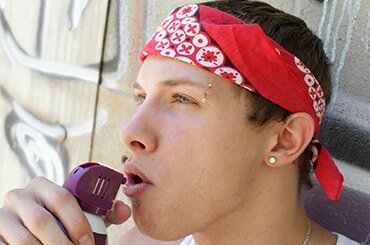- What Are Inhalants?
- Signs and Symptoms of Inhalants Abuse
- What Are the Effects of Abuse?
- Mixing with Other Substances
- How is Inhalant Abuse Diagnosed?
- Who is at Risk for Addiction?
- When to Seek Help
- Help for Addicted Friends and Family
- Inhalant Rehab and Treatment Options
- Teen Inhalant Abuse and Addiction
What is Inhalant Abuse?
Inhalants are increasingly popular, particularly among the youngest drug users. Between 10-15% of 8th graders report using inhalants.
Users inhale these drugs for a quick and powerful high, but the effects of these drugs vary quite a bit. Some--like laughing gas, or nitrous oxide--offer a relaxing sensation as they depress the brain and central nervous system. Others, such as nitrite--containing butane, increase blood flow and may have moderately stimulating effects.

What Are Inhalants?
Signs and Symptoms of Inhalants Abuse
The high associated with inhalants is quick and often short--lived, which means users can use these drugs and then appear normal in a relatively short period. If you're concerned that someone you love might be using these dangerous chemicals, some telltale signs include:
- Finding used aerosol cans in their room, or noticing that volatile or inhalable substances quickly disappear from your refrigerator or home.
- Slurred speech.
- Decreased coordination.
- Disappearing frequently to use drugs.
- Changes in appearance, behavior or academic performance.
- Periods of unusual behavior such as laughing fits, giddiness or anxiety.
- Nose bleeds and sinus problems.
- Frequent headaches.
What Are the Effects of Abuse?

Inhalants are popular among young drug users because these users mistakenly believe that inhalants are safer than illegal street drugs. Inhalants, though, are among the most dangerous drugs because it's so hard to control the dosing.
Few users overdose with their first use of other drugs, but it's possible to overdose the very first time you abuse an inhalant.
Therapists are Standing By to Treat Your Depression, Anxiety or Other Mental Health Needs
As with other drugs, the symptoms of inhalant abuse tend to worsen over time. Recreational use quickly gives way to addiction, and addiction significantly increases your chances of experiencing severe health problems. However, you don't need to be an addict to suffer inhalant--related problems, so don't lull yourself into a false sense of security just because you've only used a couple of times.
Some of the most common effects of inhalant abuse include:
- Central nervous system depression that, over time, can lead to respiratory depression and/or suffocation.
- Permanent brain damage (from anoxic brain injury or direct inhalant toxicity), including brain bleeds, loss of intelligence, memory problems, the death of brain cells, and changes in personality, mood, and behavior.
- "Behavioral toxicity" - because the level of short--term intoxication from certain inhalant varieties can be so pronounced, many accidents or other bodily injuries are likely to occur.
- Relationship, carer, legal, or financial problems.
- Addiction.
- Sinus problems, including bloody noses and frequent sinus infections.
- Dental issues, including swollen or blood gums, cavities and lost teeth.
- Mental health issues, most notably depression, anxiety and paranoia.
- Sudden death due to accidental overdose or brain damage.
- Frequent illness.
- Respiratory difficulties such as shortness of breath.
- Stroke, heart attack, and other cardiovascular problems.
- Cancer.
- Poisoning? many of the substances contained in inhalants are potentially lethal.
- Organ damage: cardiotoxicity (heart disease), hepatotoxicity (liver disease) can result from both short--term and prolonged huffing of certain volatile chemicals.
Mixing with Other Substances
When combined with other substances, the effects can be lethal.Inhalants are among the most deadly drugs available, so mixing them with other potentially lethal substances is a recipe for medical disaster. The effects of inhalants are unpredictable enough on their own, but when combined with other substances the effects can be lethal.
Users can experience mental health issues, changes in perception, sudden death, seizures, and a host of other health challenges. You are significantly more likely to die due to an accidental overdose when you mix multiple substances.
How is Inhalant Abuse Diagnosed?
Who is at Risk for Addiction?

Researchers are still exploring the chemistry of addiction and are still not fully sure why some people become addicts, and some don't.
Some of the most common risk factors for addiction include:
- A history of traumas such as rape or domestic abuse.
- A family history of addiction? both genetic factors and the coping skills you learned from your family can prime your brain for addiction.
- Stress.
- Mental illness? about half of people with a mental health condition become addicts.
- A history of health problems? some people use inhalants to cope with the challenges of chronic illness.
- Being young? young people are much more likely to try inhalants. For example, eighth graders report a higher rate of inhalant use than 12th graders.
The single biggest risk factor for inhalant addiction, though, is using inhalants. You can't become addicted to a drug you never try, but if you're a recreational inhalant user, addiction becomes increasingly likely with each dose.
When to Seek Help
There's no wrong time to seek treatment for an inhalant addiction. In fact, the longer you wait, the worse your addiction is likely to get. Addiction is not a choice or a moral failing? it's a disease that produces measurable changes in your body and brain.
Your addiction is not your fault, but it's up to you to show the courage necessary to seek the help you need.
Some signs that you will need treatment if you want to recover include:
- Giving up things you love because of inhalants.
- Getting into legal trouble because of inhalants.
- Inhalant--related health problems.
- Loved ones who ask you to quit using.
- Using inhalants to cope with mental or physical illness.
- Relying on inhalants not to get high, but to feel like yourself.
- Feeling despondent about your ability to ever get clean.
- Doing or saying things you regret while under the influence of inhalants.
Call our toll-free hotline at 1-888-993-3112Who Answers? today.
Help for Addicted Friends and Family
 Get Support at NA
Narcotics Anonymous offers a 12-step recovery program to help those addicted to inhalants and other drugs. Find a meeting for you or your loved one.
Inhalants can be instantly deadly, leaving people who love inhalant addicts in a near- constant state of panic. Loving an addict is inherently challenging.
Get Support at NA
Narcotics Anonymous offers a 12-step recovery program to help those addicted to inhalants and other drugs. Find a meeting for you or your loved one.
Inhalants can be instantly deadly, leaving people who love inhalant addicts in a near- constant state of panic. Loving an addict is inherently challenging.
The person you loved may seem to disappear behind the veneer of addiction, emerging only to ask you for money and make promises he or she has no intention of keeping.
It's easy to get angry, but addiction is a disease just like diabetes or cancer. It's not the addict's fault that addiction compromises her judgment though the addict you love is responsible for how he or she treats you.
You can't force someone you love to seek treatment, but you can foster an environment in which recovery seems like the best option. Don't enable the addict you love by giving them money to pay for drugs or provide them with a rent-free place to live.
When addiction is easy, addicts have every reason to keep using, and almost no incentive to get clean.
Be clear about your boundaries, and then enforce them--even when doing so is difficult.
Inhalant Rehab and Treatment Options
Inhalant addiction is a severe disease and demands prompt treatment just as any other medical condition. Addicts can choose between inpatient or outpatient programs depending on their needs and schedule, with some addicts starting with an inpatient program and then transitioning into outpatient care.
Outpatient Recovery Options
Inpatient Recovery Options
Teen Inhalant Abuse and Addiction
Inhalant abuse is much more common among teens than it is among adults.
Inhalant abuse is much more common among teens than it is among adults. For many teens, the decision to use inhalants is an impulsive one inspired by peer pressure and the ready availability of these drugs. Thus, parents who are concerned about inhalant use may want to reduce the availability of aerosol cans, butane products, and other tempting options.
If your teen has developed an addiction to inhalants, you need to act quickly. Even a single use of inhalants can prove fatal, so your most sacred duty is to ensure your teen stays alive. Inpatient rehab is often the best option because it removes your teen from the environment that encouraged them to use.
Now is the time to use your authority as a parent to force your teen to pursue treatment. They don't have to like it. After all, addiction clouds their judgment. But by encouraging them to seek help, you ensure they'll make it to adulthood and enjoy a happy life.
